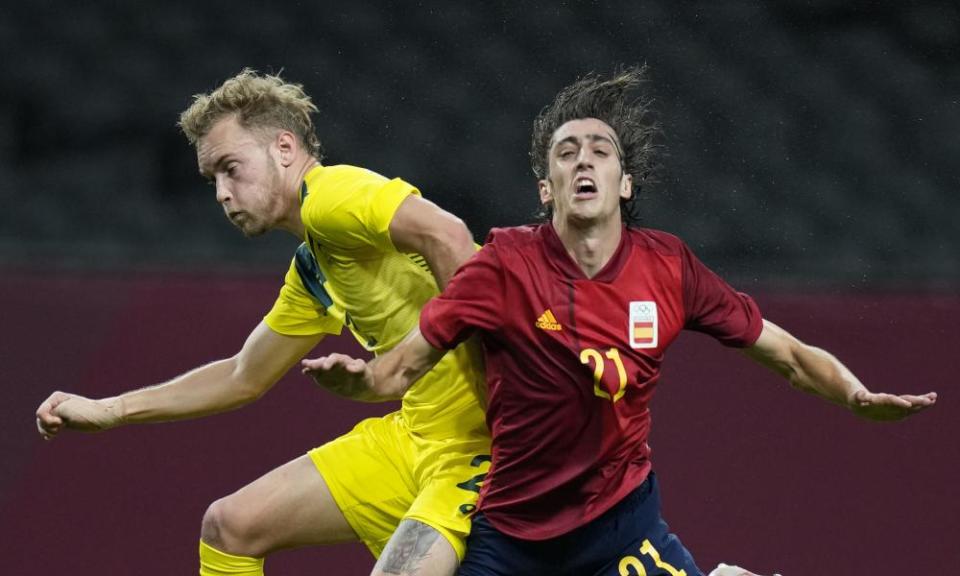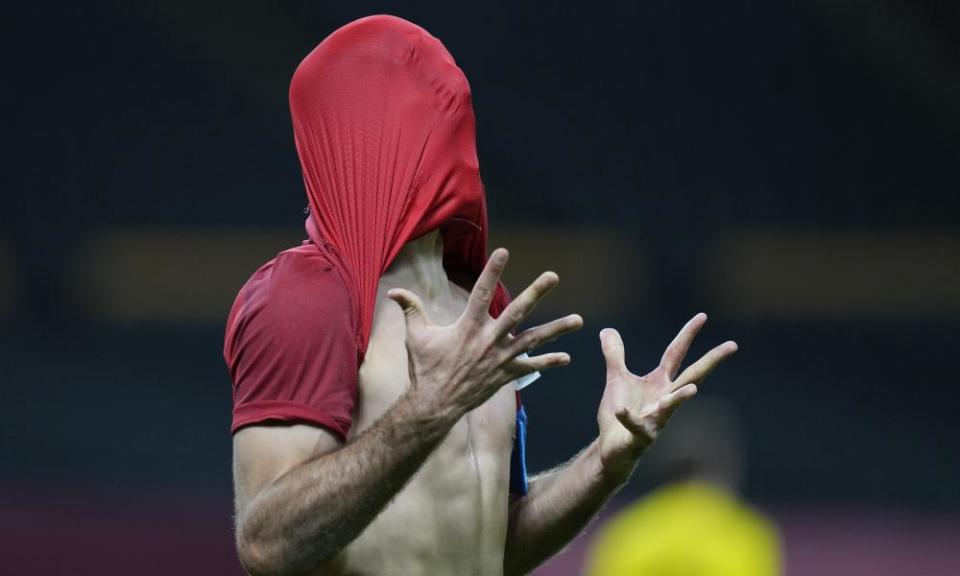Even after loss to Spain, Australia have Olympics fate in their hands

Avoid a loss against a team which has not won. It is a task in equal parts uncomplicated and daunting for Australia’s under-23s who, after Sunday night’s 1-0 loss to Spain, must at least draw with Egypt on Wednesday to make the knockout stages of a tournament they were never supposed to contest in the first place.
Related: Ruthless USWNT hit six against New Zealand to revive Olympic campaign
Australian men’s football was dead, they had said. It passed away a long time ago. At the Olympics, at least, it happened back in 2008 – the last time the Olyroos qualified for a Games. They went out in the group stage then, with no wins and two losses and Graham Arnold as manager.
Twelve years later and back under Arnold, as the cynics chortled heartily between quips about the standard of the country’s top-tier domestic competition, a team comprised mostly of A-League faces and a few Europe-based prospects qualified for Tokyo 2020. They did so to barely a whiff of acknowledgement, let alone any fanfare.
The Matildas were the football team to watch in Japan and, as the women shouldered the expectation that comes with the limelight of recent success, their male counterparts quietly plugged away. Then, on Thursday night, they beat Argentina.
It was not an Argentina with Lionel Messi, like the one which beat the Olyroos 1-0 at Beijing 2008, but it was still one highly fancied in a particularly difficult group. When Egypt held Spain goalless in Group C’s other opening match, Australia could suddenly, realistically, aim to emerge unscathed against a European heavyweight featuring six members of its Euro 2020 squad. It very nearly came to fruition at the Sapporo Dome even though, in truth, Spain were a marked step above.
Where the Olyroos had played Argentina in the truest sense of the word, here they watched the playing occur in front of them, around them and through them, often trapped in their own third and endeavouring only to stop their opponents’ relentless fluency from finding their net.

In that respect, at least until the 81st minute, it was a job done. Australia, while nervy and holding the ball at their feet too long, were sound enough in shape to offer counter-attacking potential. It was a setting fit for someone like Daniel Arzani, the perennial underachiever who continues to tease with potential never quite realised. It was he who made it closest to Spain’s goal in the first half, via a run to the box that ultimately fizzled.
Spain, who finished the match with 68% possession and 15 shots to Australia’s two, looked to have this in hand for the duration. And yet Javier Puado’s early backheel did not turn into the exquisite goal he had hoped and Mikel Oyarzabal did not intend to hit the crossbar, nor did their fellow attackers plan the second-half profligacy which further delayed their opening goal of the tournament.
They probably also did not envisage the pluck of right-back Nathaniel Atkinson, who stole the ball off Puado, made a crucial clearance to stop Marc Cucurella, and continued to press and prod to keep the 10 men around him in the game.
Tom Glover helped, too – even if he had some assistance from an unlikely source in Pedri, who directed two straightforward shots directly to the goalkeeper either side of the break. Still, the 18-year-old Barcelona midfielder diverted the attention in much the same manner as his breakout Euro 2020 tournament. In the end, it took a substitute with more than 100 appearances for Real Madrid to split them, as Marco Asensio delivered a cross so inviting Oyarzabal simply had to oblige.
Related: Sign up for the Tokyo 2020 daily briefing: the best of the Olympics and Paralympics
Once the final dozens minutes were done, after Harry Souttar’s head had twice come agonisingly close to connecting with a maybe equaliser, Australia sat second in Group C, with four points from two games and a final outing against last-placed Egypt set to determine their fate.
“I’m very proud of the performance and the players,” Arnold said. “They put in a fantastic effort against obviously a very good football nation and team in Spain but I thought we did exceptionally well. We’re sitting here today with qualification in our own hands, so it’s all up to us.”
Arnold will be without Mitch Duke, Riley McGree and Atkinson against Egypt match due to suspension after all three received their second yellow card of the tournament. “We’ve got depth, we’ve got fresh players ready to go,” Arnold said. “OK, three players are suspended, but they will be ready for the quarter-finals.”

 Yahoo Sports
Yahoo Sports 